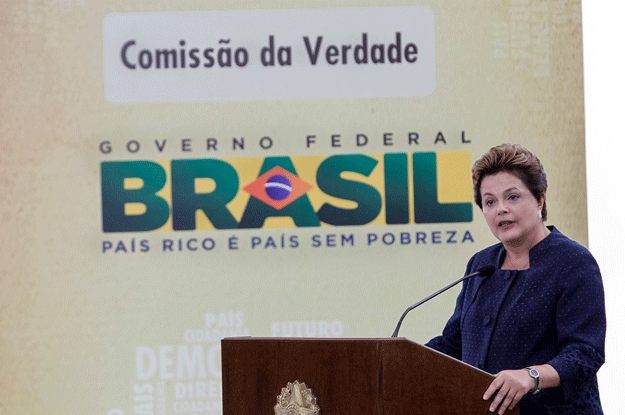Last December, Brazil’s National Truth Commission handed President Dilma Rousseff a 1,000-page report detailing human rights violations and acts of torture carried out during the country’s 1964–1985 dictatorship. A somber Rousseff recalled her own incarceration and torture as a young guerrilla leader and asked the audience to remember those lost during that dark period in Brazil’s history.
“Shadows and lies cannot bring reconciliation; Brazil deserves to know the truth,” Rousseff said, as she fought back tears. “Those who lost friends and family and who continue to suffer with their loss every day deserve to know the truth.”
Months later, the tears have dried but the shadows remain. The National Truth Commission’s two-and-a-half-year investigation has ended, but the relatives of people who were executed and disappeared by the military await government action.
The Commission’s report presented 29 recommendations and accused 377 people of carrying out state-sanctioned human rights violations between 1961 and 1988.
“Most of the people who were named in this report are already senior citizens,” Mauricio Santoro, a human rights adviser at Amnesty International Brazil, told Americas Quarterly. “If the process of bringing them to justice doesn’t begin soon, nothing will come of these findings.”
No one has ever been convicted for crimes committed under Brazil’s dictatorship. Many of the accused have hidden behind Brazil’s 1979 Amnesty Law, passed by the country’s last military ruler, which pardoned crimes committed by both political activists and military personnel.
“The Brazilian exception has made us out to be the odd ones on the international stage,” Santoro said. “It’s one thing to defend this type of impunity in the 1980s, when no one had taken their dictators to trial. But in 2015, every other country has been able to make it happen except for us.”
Argentina, Uruguay and Chile were also ruled by military dictatorships beginning in the mid-1970s. All three countries have since repealed amnesty laws that protected human rights violators who acted under orders from military regimes.
Brazil’s Order of Attorneys attempted to amend the amnesty law in 2010, but the Supreme Court voted down the initiative.
Pedro Dallari, the Truth Commission’s former president, says the report’s findings could help modify and even annul the amnesty law.
“The Attorney General’s office has used some of the information in the Truth Commission’s report to intensify its own investigations,” said Dallari, who believes any change to the amnesty law will come from the judicial system. “This is not the same Supreme Court we had in 2010—it is less conservative now.”
Still, the House and Senate also proposed amendments last year. Communist Party Congresswoman Jandira Feghali presented a bill to try those protected under the amnesty law and strip the now-deceased military presidents of their titles.
“Crimes against humanity cannot be trumped by amnesty or pardons,” said Feghali. “Furthermore, many of these crimes are still open cases because they deal with people who were kidnapped or disappeared, whose whereabouts and remains were never discovered.”
For Victória Grabois, president of the NGO Tortura Nunca Mais (Torture Never Again), the problem with the law lies in its interpretation.
“We don’t need a new law, we just need our justice system to know how to interpret the law and to respect the interpretation of international entities, like the Inter-American Court of Human Rights (IACHR), which clearly states that anyone accused of torture or crimes against humanity cannot be protected under [an] amnesty law,” Grabois said.
Grabois’ father, brother and husband were all disappeared during the dictatorship. She and several other ngos brought their case and that of 60 other vanished guerrilla members to the IACHR in 2010. The court ruled in favor of Grabois’ group in Gomes Lund et al. v. Brazil and found Brazil to be in violation of the American Convention on Human Rights. It also demanded access to classified military documents.
The Brazilian armed forces have never recognized the crimes committed during the military junta’s rule as systemic, and blame violations that took place on the “actions of individuals.”
“The armed forces need to step forward and accept that they were responsible for these killings and tortures,” Dallari said. “These were institutional mandates put in place by a chain of command that went all the way to the president. If they can’t acknowledge that, there will always be doubts surrounding their commitment to democracy.”






